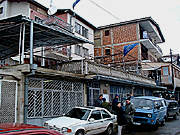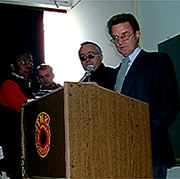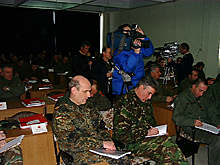|
Training
the Kosovo Protection Corps in Kosovo. A Report
By
Kerstin Schultz
A huge task - on Women's Day,
in Mitrovica
The day after a violent clash with several people
wounded, from the UN as well as Albanians and Serbs I
arrived in Mitrovica, described in Western media as "the
most dangerous European city". The first people I met
were some happy youngsters jumping on the road waving
hello. Then I was addressed by a Kosovar with a friendly
"Congratulations". When I looked confused another man
explained, "Don't you know, today is March 8th, the
International Women's Day."
I was in Mitrovica invited as a TFF associate by IOM,
the International Organization for Migration, to give
lectures as a part of a training program for members of
KPC, the Kosovo Protection Corps, most of whom are former
KLA soldiers, now transformed to a civil protection
corps. This training program involved about 500 KPC
leaders in middle positions.
 Photo
© TFF Photo
© TFF
The
HQ of IOM,
the International
Organisation of
Migration
|
30.700 applicants were registered and they
have all gone through intelligence and attitude
tests. From this group 5.000 have been selected,
2.000 as reservists and 3.000 as active KPC
members, located in six different cities,
Pristina, Skenderaj, Prizren, Pec/Gjakova,
Mitrovica and Gjilan.
IOM is tasked with training them to go
through the transformation from being warriors
to become civilians, live a civilian life and
perform professionally as KPC members.
I was seriously worried about the
possibilities to talk about conflict management
and reconciliation in this very tense situation.
However it turned out very much the other way,
with lots of positive emotions. I have seldom -
perhaps never - experienced such deep feelings
of the importance of these topics to be
addressed directly to the involved parties in
complicated post-war situations as that day in
Mitrovica.
|
The themes of my training
sessions
The lecture in Mitrovica was performed in a
municipality building in bad condition, being
reconstructed. Participators were about 60 men from KPC.
They were all dressed as soldiers, in military uniforms,
some with flak jackets and some even carrying short
weapons. My lecture was about skills needed in
leadership. The main subjects were: a) a short
introduction about my own experiences visiting Kosovo
several times since 1991 on my experiences from
reconciliation work in different parts of the former
Yugoslavia, e.g.. with people in Mostar and Vukovar, b) a
short introduction on leadership and empowerment and
skills needed. Small training in self-knowledge &endash;
to reflect on your own behaviour; c) the basics of
conflicts in general and the role of conflicts in our
lives. Attitudes towards conflicts; d) conflict
behaviour; e) when do conflicts produce violence? - and,
finally, f) conflict-resolution: how to deal with
conflicts in a productive manner?
So much for the first part of my lecture. After the
break I focussed on forgiveness within the larger
framework of reconciliation. I went on to the central
issue of mourning and how to free one self from the
burden of hatred and the need of/right to revenge. I
started with a general approach and ended up with the
actual situation in Kosovo and really just outside the
door.
My approach was to talk directly to the participants,
to get them involved and to touch their feelings in order
to permit them to open up to insights they already have
but have not been allowed, or able, to address.
In the first part of my lecture, I think, I succeeded
in getting the participants to actively take part and
reflect. In the second part about reconciliation I could
feel and see the deep affection in the eyes of the
participants, although it was such a large group. They
were very active in the first part of the lecture, giving
comments and asking questions. In the second part I could
experience a silent, very active listening.
A rose - and other
reactions
After the lecture I got several positive responses
from the audience &endash; as well as from the
interpreters. Some of them told me that they had really
learned something, something new. They not only
applauded, I also received a red rose from the
participants. We were all very touched of the
situation.
In Gjilan my lecture was performed in the same way in
front of about 50 participants from KPC. They were very
actively taking part and asked questions. We all agreed
that we needed more time. In the second part about
reconciliation there was a very concentrated and
emotional atmosphere. Warm applause again, and several
participants told me that they wanted more training like
this. The interpreters were positive: "You really made a
success! We have worked with them these days during the
training course but we have never seen them listen so
intensively."
During both my lectures there were no threatening
situations or tense reactions &endash; although the
reactions were full of strong emotions. In order to
create a sustainable peace process, I am convinced by
years of work in the field, that there is a great need
for reconciliation work. It takes time and it must be
done with the parties on all sides.
For me as a woman, it was a very special feeling to
visit Mitrovica on the International Women's Day and
interact with former KLA warriors on these deeply
personal, indeed existential issue.

Photo © TFF
Dr.
Kouchner, Chief of the UN mission,
UNMIK, opens the KPC seminar
What's so wrong with the
international community's approach
I could really experience what the priorities of the
international so-called community are. There was no lack
of weapons, armoured personnel carriers, military jeeps
or any military equipment, you name it. But no unit, not
even a full-time staff member, works with the existing
deep lack of trust, with the manifest hate, or with the
need for forgiveness, tolerance and reconciliation. I
couldn't see any attempts in that direction.
My view is that everything with male association -
such as as APCs, weapons of all kinds, barbed wires,
mobile phones, cars and so on are plenty and have
received enormous resources. In contrast, things with
female associations and affecting the civil society and
the elementary conditions of every day life is very
neglected - if working at all.
As a privileged foreigner, I stayed in a private
pension in Pristina, without heating and shortage of
water and electricity only available for a few hours a
day. I could not wash my hair or take a shower during my
five days visit in Kosovo. But I learned quickly what
"auto lasje" means - car wash. There are several "auto
lasjes" in every single village but water supply for
washing and the households doesn't work.
I do remember from my visits to Kosovo in the early
90th that there were problems in taking care of the
garbage due to the conflict between Serbs and Albanians.
Today I can really see and smell how that garbage
management is no longer a problem but a catastrophe. It
doesn't seem to be of any priority though garbage
collecting and garbage management could give many
meaningful and necessary work opportunities to many
unemployed people who need an income. The same can be
said for all the aluminium cans which can be found in
drifts everywhere as a gift from all the internationals
drinking coke everywhere, anytime. We have solved that
problems long ago; if people in Kosovo would get money
for every can, they would have been collected in no
time.

Photo © TFF
Participants
in the KPC training, men in uniforms,
many armed - although it is a civilian
force
Dangerous traffic...culture
of violence.
The traffic is most dangerous in Kosovo. The roads are
in a terrible condition and the traffic is chaotic.
Military convoys, APCs, lorries, new cars, 4-wheel cars,
worn-out busses together with tractors and horse wagons.
And people! Why has so little been done to repair the
infrastructure? Several of the Kosovars told me that they
thought the war was over but today they still wake up of
the flapping sound of the helicopters and there are just
soldiers, weapons and APCs all over the place. Oh, an
quite a few drive stolen cars without plates and without
driving licences.
I have seen in Mostar, Eastern Slavonia and elsewhere
how ambitious peacebuilding work has failed due to lack
in this respect. Lots of money has been used to rebuild
destroyed houses and bridges &endash; but to little has
been done to rebuild - social - bridges between people
and individuals.
It is necessary to break the destructive spirals of
revenge, hate and violence. If not, this culture of
violence will be inherited and handed over to future
generations. If we don't even try to help "repair" the
souls, what's the point of all the economic aid, the
soldiers and the managers. Can there be democracy with
continued hate?
Identify the peace pioneers
first.
However difficult it may seem, it is my experience
that it IS possible to identify dialogue-oriented
individuals from all sides involved in a conflict. It is
with their help , we can assist in re-building
confidence, tolerance and community. I would say that
that is the first difficult step on the long road to a
lasting peace.
Such training should, I believe, take place in Kosovo.
In must happen on all sides and not just vis-a-vis the
Albanians. We must work first with participants from each
side on its own and in then bring small, mixed
peace-pioneering groups together. It's a soft approach,
but over time even water shapes the hardest of
stones.
Kerstin Schultz
April 2000

Tell a friend about this article
Send to:
From:
Message and your name
|